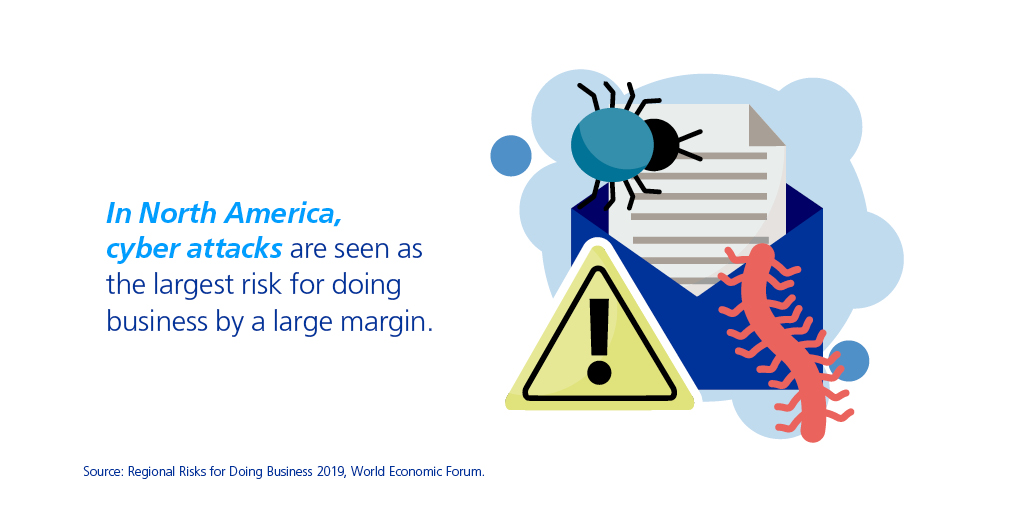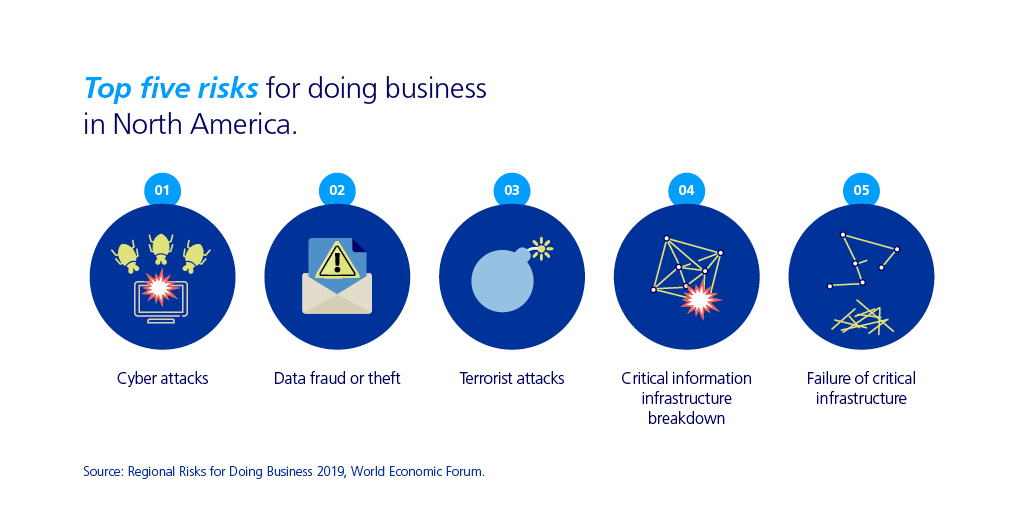2019 WEF survey notes cyber attacks still a top worry for businesses
Global risksArticleOctober 8, 2019
By Kathleen Savio, Chief Executive Officer, Zurich North America
Risk is an inherent aspect of running a business. Without the willingness to accept risk, no entrepreneur could launch a business venture and no innovator would bet on a new idea. On top of that, the risks of doing business are continuously evolving, which is why Zurich is deeply committed to understanding and responding to the risks impacting the businesses we serve.
Gauging the top risks on the minds of executives in eight key regions of the globe was the objective of the World Economic Forum’s (WEF) Regional Risks of Doing Business 2019 survey. While WEF’s annual Global Risks Report, for which Zurich provides content, studies a broad range of high-level risk factors based on input from corporations, governments, non-governmental organizations, academia and a host of global opinion leaders, the Regional Risks of Doing Business 2019 survey narrows its focus to the impacts of 30 different factors affecting the business environment.
This year’s survey polled nearly 13,000 executives in North America, Latin America and the Caribbean, Europe, Eurasia, South Asia, the Middle East and North Africa, East Asia and the Pacific, and Sub-Saharan Africa.
Looking exclusively at North America, executives in the U.S. and Canada once again selected “cyber attacks” as the factor topping their lists of the top five risks affecting how they do business—and by wide margins. Apprehension over this risk is driven by awareness of the growing sophistication of cyber criminals and the dramatic proliferation of malware and ransomware flooding the online risk environment. Knowledge of the disruptions that ransomware attacks have inflicted on municipalities and businesses in the U.S., including well-publicized 2019 attacks on Baltimore and Atlanta, have done much to keep the threat of cyber attacks top of mind.

Close behind cyber attacks was the related technology risk of “data fraud or theft,” focusing on breaches and theft of personal information maintained by businesses and institutions. Over the past several years, major corporations, healthcare institutions, credit bureaus and other organizations have been impacted by data breaches and the theft of their customers’ personally identifiable information. According to one source quoted in the Regional Risks of Doing Business 2019 report, the financial services industry experienced 3,494 successful intrusions by August 2019.
Cyber risk is an issue Zurich focuses on at multiple levels. We continue to explore the topic in alliance with WEF’s Global Risks Report, contributing the knowledge of our own subject matter experts. In the U.S., we work with Advisen Ltd., a respected source of data and technology insights for the commercial insurance industry, studying the potential impacts of cyber attacks on corporate customers. Advisen and Zurich have just released the results of the 2019 Advisen Cyber Survey based on feedback from U.S. risk managers. In addition to fact finding, Zurich provides customers with a variety of cyber risk review and monitoring services, delivered both by our own Risk Engineering specialists and in collaboration with an experienced third-party cyber security organization. And within the past year, Zurich launched a new Cyber Insurance Policy designed to significantly raise the bar on the breadth and depth of coverages provided to today’s risk managers.
Of course, cyber attacks were not the only concerns identified in the Regional Risks of Doing Business 2019 survey by executives in North America. “Terrorist attacks,” including foreign actors and domestic mass shooting incidents, represented the third most common worry of U.S. business leaders. “Critical information infrastructure breakdown,” addressing the technology risks associated with the rapidly expanding Internet of Things (IoT), was the fourth of the top five risks, with number five being the “failure of critical infrastructure,” reflecting increasing business concerns over the nation’s need to boost investments in its bridges, roads, airports and other drivers of economic activity. On this point, the report notes that the latest American Society of Civil Engineers (ASCE) report card gave the U.S. a “D+” grade on the current state of its infrastructure, only slightly better than “unfit for purpose.”

As a global company, Zurich is proud of our close association with the WEF organization and our role as a collaborator in their important risk insight initiatives, including the annual Global Risks Report published during WEF’s January conference in Davos, Switzerland. The Regional Risks of Doing Business 2019 report is part of the organization’s Global Risks Initiative, an ongoing workstream analyzing critical global risks and communicating these risks to stakeholders and the global public through a variety of digital and media channels.
At Zurich, we believe that living up to our objective to be a customer-led organization depends heavily on our ability to understand the risks that keep our customers awake at night. This understanding enables us to provide customers with risk management products, tools and insights they need to lead their businesses today and into the future.
From Kathleen Savio, CEO Zurich North America








